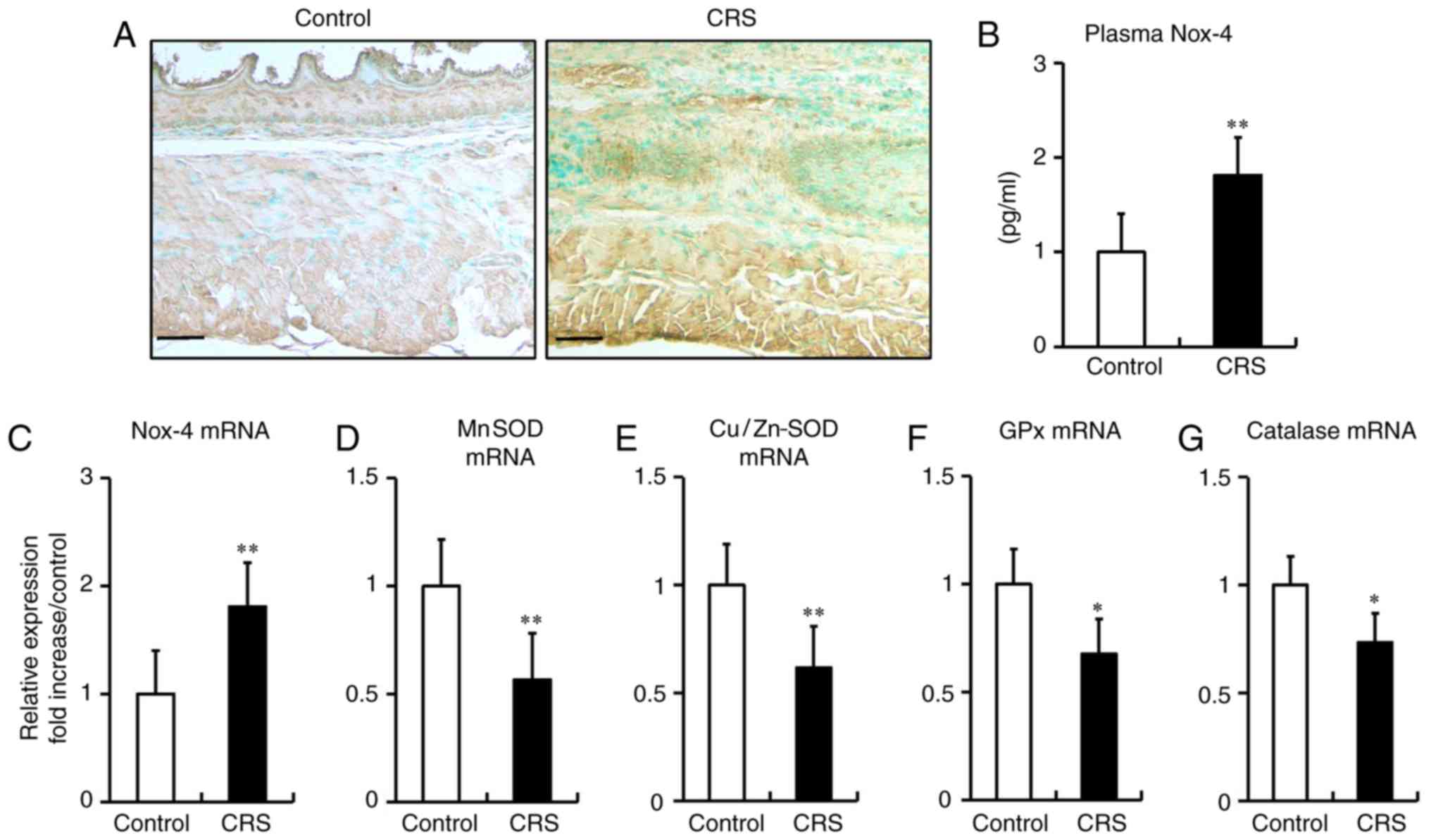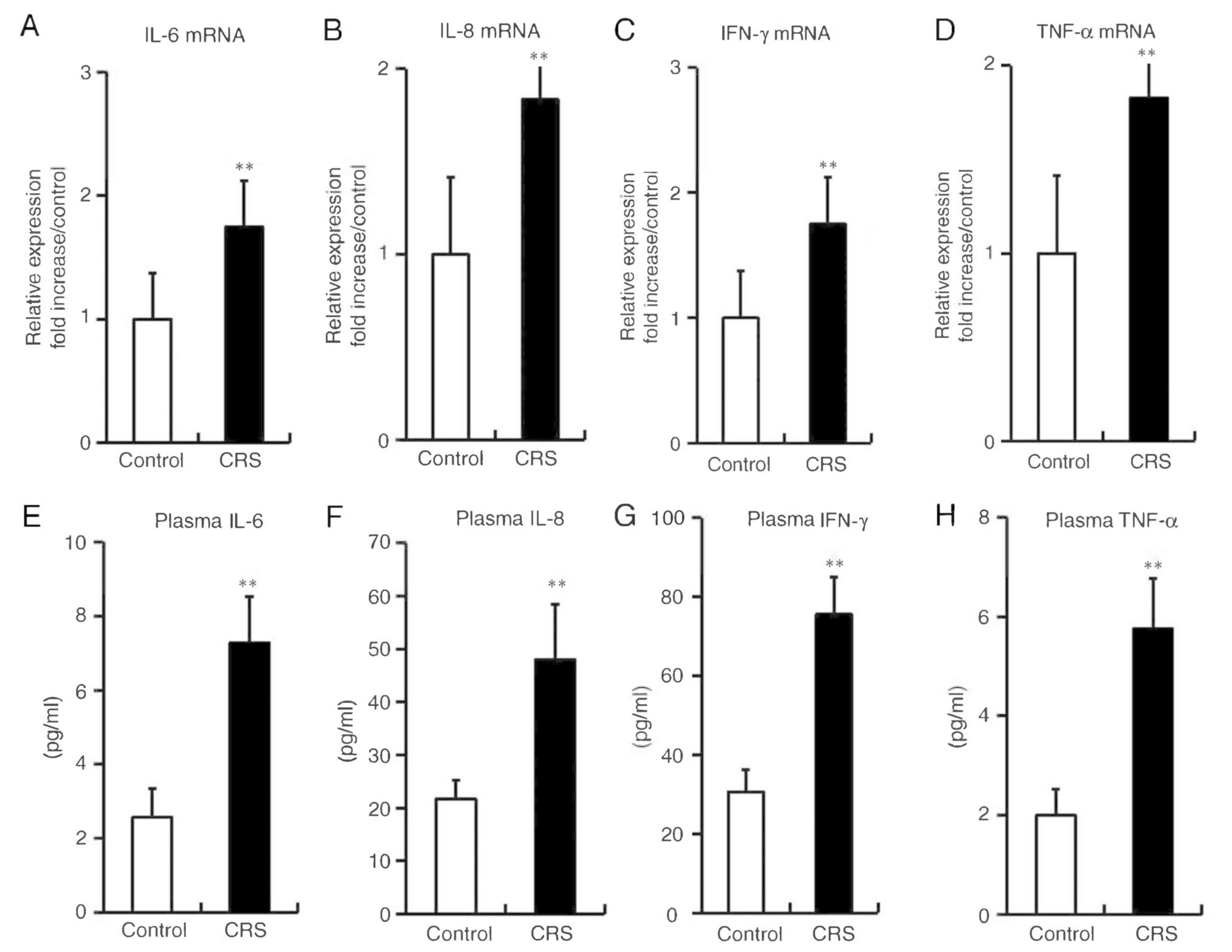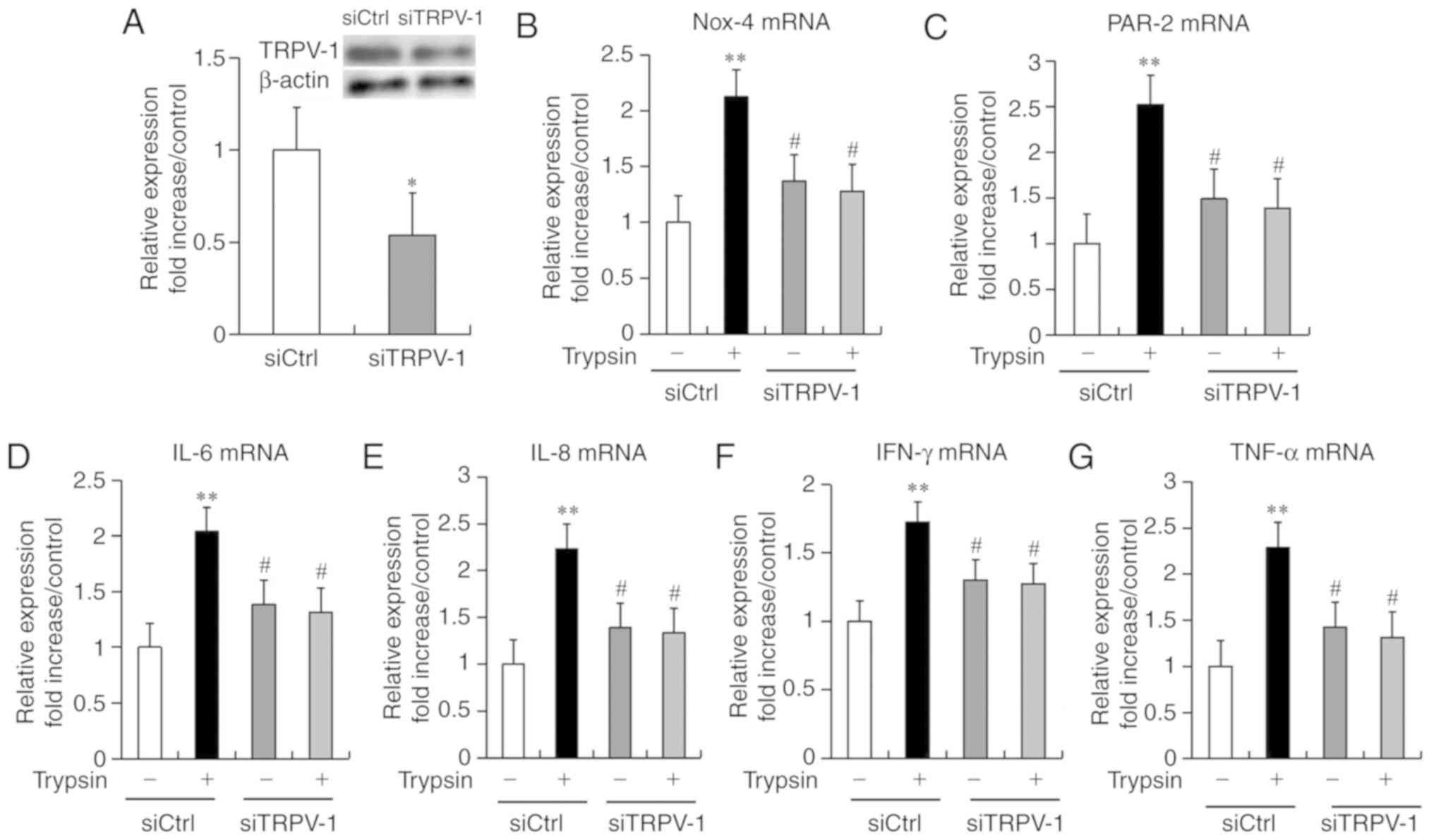|
1
|
Landsbergis PA: The changing organization
of work and the safety and health of working people: A commentary.
J Occup Environ Med. 45:61–72. 2003. View Article : Google Scholar : PubMed/NCBI
|
|
2
|
Liu YZ, Wang YX and Jiang CL:
Inflammation: The common pathway of stress-related diseases. Front
Hum Neurosci. 11:3162017. View Article : Google Scholar : PubMed/NCBI
|
|
3
|
Zafir A and Banu N: Modulation of in vivo
oxidative status by exogenous corticosterone and restraint stress
in rats. Stress. 12:167–177. 2009. View Article : Google Scholar : PubMed/NCBI
|
|
4
|
Halliwell B: Oxidative stress and
neurodegeneration: Where are we now? J Neurochem. 97:1634–1658.
2006. View Article : Google Scholar : PubMed/NCBI
|
|
5
|
Linares V, Sánchez DJ, Bellés M, Albina L,
Gómez M and Domingo JL: Pro-oxidant effects in the brain of rats
concurrently exposed to uranium and stress. Toxicology. 236:82–91.
2007. View Article : Google Scholar : PubMed/NCBI
|
|
6
|
Bedard K and Krause KH: The NOX family of
ROS-generating NADPH oxidases: Physiology and pathophysiology.
Physiol Rev. 87:245–313. 2007. View Article : Google Scholar : PubMed/NCBI
|
|
7
|
Lee KW, Kim JB, Seo JS, Kim TK, Im JY,
Baek IS, Kim KS, Lee JK and Han PL: Behavioral stress accelerates
plaque pathogenesis in the brain of Tg2576 mice via generation of
metabolic oxidative stress. J Neurochem. 108:165–175. 2009.
View Article : Google Scholar : PubMed/NCBI
|
|
8
|
Kondo T and Miwa H: The role of esophageal
hypersensitivity in functional heartburn. J Clin Gastroenterol.
51:571–578. 2017. View Article : Google Scholar : PubMed/NCBI
|
|
9
|
Fass R, Naliboff BD, Fass SS, Peleg N,
Wendel C, Malagon IB and Mayer EA: The effect of auditory stress on
perception of intraesophageal acid in patients with
gastroesophageal reflux disease. Gastroenterology. 134:696–705.
2008. View Article : Google Scholar : PubMed/NCBI
|
|
10
|
Schey R, Dickman R, Parthasarathy S, Quan
SF, Wendel C, Merchant J, Powers J, Han B, van Handel D and Fass R:
Sleep deprivation is hyperalgesic in patients with gastroesophageal
reflux disease. Gastroenterology. 133:1787–1795. 2007. View Article : Google Scholar : PubMed/NCBI
|
|
11
|
Bradley LA, Richter JE, Pulliam TJ, Haile
JM, Scarinci IC, Schan CA, Dalton CB and Salley AN: The
relationship between stress and symptoms of gastroesophageal
reflux: The influence of psychological factors. Am J Gastroenterol.
88:11–19. 1993.PubMed/NCBI
|
|
12
|
Altomare A, Luca Guarino Sara Emerenziani
MP, Cicala M, Drewes AM, Krarup AL, Brock C, Lottrup C, Frøkjaer
JB, Souza RF, Nardone G and Compare D: Gastrointestinal sensitivity
and gastroesophageal reflux disease. Ann N Y Acad Sci. 1300:80–95.
2013. View Article : Google Scholar : PubMed/NCBI
|
|
13
|
Souza RF: Bringing GERD management up to
PAR-2. Am J Gastroenterol. 105:1944–1946. 2010. View Article : Google Scholar : PubMed/NCBI
|
|
14
|
Kandulski A, Wex T, Mönkemüller K, Kuester
D, Fry LC, Roessner A and Malfertheiner P: Proteinase-activated
receptor-2 in the pathogenesis of gastroesophageal reflux disease.
Am J Gastroenterol. 105:1934–1943. 2010. View Article : Google Scholar : PubMed/NCBI
|
|
15
|
O'Brien PJ, Molino M, Kahn M and Brass LF:
Protease activated receptors: Theme and variations. Oncogene.
20:1570–1581. 2001. View Article : Google Scholar : PubMed/NCBI
|
|
16
|
Yoshida N, Katada K, Handa O, Takagi T,
Kokura S, Naito Y, Mukaida N, Soma T, Shimada Y, Yoshikawa T and
Okanoue T: Interleukin-8 production via protease-activated receptor
2 in human esophageal epithelial cells. Int J Mol Med. 19:335–340.
2007.PubMed/NCBI
|
|
17
|
Vergnolle N, Bunnett NW, Sharkey KA,
Brussee V, Compton SJ, Grady EF, Cirino G, Gerard N, Basbaum AI,
Andrade-Gordon P, et al: Proteinase-activated receptor-2 and
hyperalgesia: A novel pain pathway. Nat Med. 7:821–826. 2001.
View Article : Google Scholar : PubMed/NCBI
|
|
18
|
Bielefeldt K and Davis BM: Differential
effects of ASIC3 and TRPV1 deletion on gastroesophageal sensation
in mice. Am J Physiol Gastrointest Liver Physiol. 294:G130–G138.
2008. View Article : Google Scholar : PubMed/NCBI
|
|
19
|
Matthews PJ, Aziz Q, Facer P, Davis JB,
Thompson DG and Anand P: Increased capsaicin receptor TRPV1 nerve
fibres in the inflamed human oesophagus. Eur J Gastroenterol
Hepatol. 16:897–902. 2004. View Article : Google Scholar : PubMed/NCBI
|
|
20
|
Amadesi S, Nie J, Vergnolle N, Cottrell
GS, Grady EF, Trevisani M, Manni C, Geppetti P, McRoberts JA, Ennes
H, et al: Protease-activated receptor 2 sensitizes the capsaicin
receptor transient receptor potential vanilloid receptor 1 to
induce hyperalgesia. J Neurosci. 24:4300–4312. 2004. View Article : Google Scholar : PubMed/NCBI
|
|
21
|
Yisireyili M, Takeshita K, Hayashi M, Wu
H, Uchida Y, Yamamoto K, Kikuchi R, Hao CN, Nakayama T, Cheng XW,
et al: Dipeptidyl peptidase-IV inhibitor alogliptin improves
stress-induced insulin resistance and prothrombotic state in a
murine model. Psychoneuroendocrinology. 73:186–195. 2016.
View Article : Google Scholar : PubMed/NCBI
|
|
22
|
Yisireyili M, Hayashi M, Wu H, Uchida Y,
Yamamoto K, Kikuchi R, Shoaib Hamrah M, Nakayama T, Wu Cheng X,
Matsushita T, et al: Xanthine oxidase inhibition by febuxostat
attenuates stress-induced hyperuricemia, glucose dysmetabolism, and
prothrombotic state in mice. Sci Rep. 7:12662017. View Article : Google Scholar : PubMed/NCBI
|
|
23
|
Li Q, Kong L, Zhang S, Zhong Z, Liu X,
Wang J and Kang J: A novel external esophageal perfusion model for
reflux-associated respiratory symptoms. Pathobiology. 77:163–168.
2010. View Article : Google Scholar : PubMed/NCBI
|
|
24
|
Yisireyili M, Uchida Y, Yamamoto K,
Nakayama T, Cheng XW, Matsushita T, Nakamura S, Murohara T and
Takeshita K: Angiotensin receptor blocker irbesartan reduces
stress-induced intestinal inflammation via AT1a signaling and
ACE2-dependent mechanism in mice. Brain Behav Immun. 69:167–179.
2018. View Article : Google Scholar : PubMed/NCBI
|
|
25
|
Livak KJ and Schmittgen TD: Analysis of
relative gene expression data using real-time quantitative PCR and
the 2(-Delta Delta C(T)) method. Methods. 25:402–408. 2001.
View Article : Google Scholar : PubMed/NCBI
|
|
26
|
Abd El-Rehim DM, Fath El-Bab HK and Kamal
EM: Expression of proteinase-activated receptor-2 in the esophageal
mucosa of gastroesophageal reflux disease patients: A
histomorphologic and immunohistochemical study. Appl
Immunohistochem Mol Morphol. 23:646–652. 2015. View Article : Google Scholar : PubMed/NCBI
|
|
27
|
Seo JS, Park JY, Choi J, Kim TK, Shin JH,
Lee JK and Han PL: NADPH oxidase mediates depressive behavior
induced by chronic stress in mice. J Neurosci. 32:9690–9699. 2012.
View Article : Google Scholar : PubMed/NCBI
|
|
28
|
Aviello G and Knaus UG: ROS in
gastrointestinal inflammation: Rescue or sabotage? Br J Pharmacol.
174:1704–1718. 2017. View Article : Google Scholar : PubMed/NCBI
|
|
29
|
Peng YL, Liu YN, Lei L, Wang X, Jiang CL
and Wang YX: Inducible nitric oxide synthase is involved in the
modulation of depressive behaviors induced by unpredictable chronic
mild stress. J Neuroinflammation. 9:752012. View Article : Google Scholar : PubMed/NCBI
|
|
30
|
Caterina MJ, Leffler A, Malmberg AB,
Martin WJ, Trafton J, Petersen-Zeitz KR, Koltzenburg M, Basbaum AI
and Julius D: Impaired nociception and pain sensation in mice
lacking the capsaicin receptor. Science. 288:306–313. 2000.
View Article : Google Scholar : PubMed/NCBI
|
|
31
|
Inci K, Edebo A, Olbe L and Casselbrant A:
Expression of protease-activated-receptor 2 (PAR-2) in human
esophageal mucosa. Scand J Gastroenterol. 44:664–671. 2009.
View Article : Google Scholar : PubMed/NCBI
|
|
32
|
Wu L, Oshima T, Shan J, Sei H, Tomita T,
Ohda Y, Fukui H, Watari J and Miwa H: PAR-2 activation enhances
weak acid-induced ATP release through TRPV1 and ASIC sensitization
in human esophageal epithelial cells. Am J Physiol Gastrointest
Liver Physiol. 309:G695–G702. 2015. View Article : Google Scholar : PubMed/NCBI
|
|
33
|
Hoogerwerf WA, Zou L, Shenoy M, Sun D,
Micci MA, Lee-Hellmich H, Xiao SY, Winston JH and Pasricha PJ: The
proteinase-activated receptor 2 is involved in nociception. J
Neurosci. 21:9036–9042. 2001. View Article : Google Scholar : PubMed/NCBI
|
|
34
|
Kirkup AJ, Jiang W, Bunnett NW and Grundy
D: Stimulation of proteinase-activated receptor 2 excites jejunal
afferent nerves in anaesthetised rats. J Physiol. 552:589–601.
2003. View Article : Google Scholar : PubMed/NCBI
|
|
35
|
Groschwitz KR, Wu D, Osterfeld H, Ahrens R
and Hogan SP: Chymase-mediated intestinal epithelial permeability
is regulated by a protease-activating receptor/matrix
metalloproteinase-2-dependent mechanism. Am J Physiol Gastrointest
Liver Physiol. 304:G479–G489. 2013. View Article : Google Scholar : PubMed/NCBI
|
|
36
|
Enjoji S, Ohama T and Sato K: Regulation
of epithelial cell tight junctions by protease-activated receptor
2. J Vet Med Sci. 76:1225–1229. 2014. View Article : Google Scholar : PubMed/NCBI
|
|
37
|
Ma J, Altomare A, Guarino M, Cicala M,
Rieder F, Fiocchi C, Li D, Cao W, Behar J, Biancani P and Harnett
KM: HCl-induced and ATP-dependent upregulation of TRPV1 receptor
expression and cytokine production by human esophageal epithelial
cells. Am J Physiol Gastrointest Liver Physiol. 303:G635–G645.
2012. View Article : Google Scholar : PubMed/NCBI
|





















